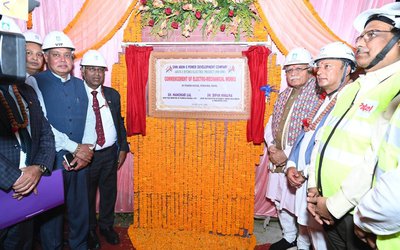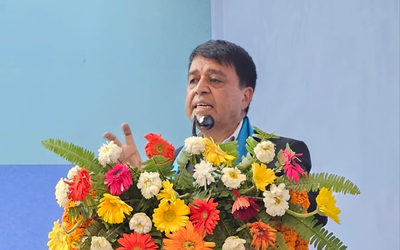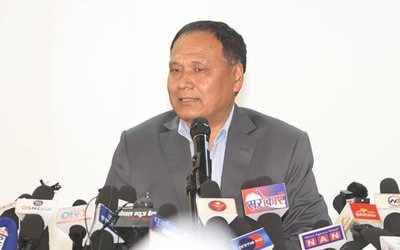
Nepal has unlimited demands and concerns. Similarly India has concerns and demands with Nepal on bilateral trade, particularly on unauthorized illegal trade. However, it took the two countries nearly two years to listen to each other and address their concerns at the highest level.
Although Nepal prepared a draft to amend certain clauses in Nepal-India Transit Treaty, it was renewed automatically without any amendment due to unreasonable stand taken by then Nepalese foreign minister Naryankazi Shestha.
Nearly overdue for one and a half years, high level Nepal-India Inter-Government Committee (ICG) meeting was held in Kathmandu discussing the grievances of both the countries. As proposed by Nepal, Indian side also agreed to review Nepal-India Transit and Trade Treaty.
Nepal and India are only two countries in the world which share a complex but an open border having tens of thousands of people crossing the border each day, exporting and importing goods worth of billions of rupees. Along with official trade, open border and informal trade is the lifeline for people living in over the 1,600 kilometer long border.
The governments from both sides impose several formal ways to curb the informal trade. Recently, the problems appeared when some miscreants and smugglers misused the informal trade into illicit trade including fake currency, drugs and arms. This is the natural concern of India.
Nepal imports almost all commodities from India and India’s ports are lifeline for Nepal’s economic development. This is the reason existing trade and transit treaties envisage holding trade talks at secretary or joint-secretary level in every six months in alternative locations in both countries.
“Both the sides reviewed the implementation of issues agreed in the past meetings and discussed on emerging and longstanding issues during the three-day meeting,” said Madhav Prasad Regmi, secretary to the Ministry of Supply, Commerce and Trade. “We come out to the agreement on most of the outstanding as well as newly emerged issues which are crucial for bilateral trade.”
As unauthorized trade is the concern of both the countries, both sides discussed measures for trade facilitation, control of unauthorized trade and facilitation for transit of goods, among other.
India is Nepal’s largest trade partner commanding two-thirds of trade. However, it has not been in favor of Nepal due supply constraints amid slowdown in industrial sector. According to the government data, Nepal imported goods worth Rs 137.87 billion from the southern neighbor over the first four months of fiscal year 2013/14 while its export during the period was confined to Rs 18.85 billion.
Nepal and India also discussed on whether to make amendments to the Nepal-India Treaty of Transit. Nepal has proposed to replace mandatory provisions of importing vehicles through containers by introducing a new provision of transporting such vehicles on-its-own-power system. Similarly, Nepal also proposed to amend a provision in the treaty that bars export of goods imported from third countries via Indian transit route.
Nepal has been demanding opening up bulk cargo shipments along Kolkata-Jogbani-Biratnagar route and Kolkata-Nautanawa-Sunauli-Bhairawa routes, implementation of trans-shipment facility as agreed by India and operationalization of additional railway routes for Nepal´s third-country trade, cancellation of Counter-veiling Duty (CVD) on Nepali exports by Indian states, settlement of outstanding dues to be received by Nepal under the Duty Refund Procedure (DRP), mutual recognition of quality certificate issued by the designated authorities of both the countries, removal of customs duty for Indian cement and clinker, and abolition of agriculture reform fee on import of primary farm products from India are also among the agendas for the meeting.
Other points for discussion are resuming circulation Indian banknotes of Rs 1,000 and Rs 500 denomination in Nepal, speeding up the process of completing Integrated Check Posts (ICPs) under implementation along the border points, ways to facilitate Nepali private sector to import petroleum products, import of cows to increase milk production, operationalization of additional customs points, and restoration of margin of preference on import duty for Indian goods.
“India is ready to review the trade treaty of 1996 with Nepal in case of any complications pertaining to bilateral trade,” said Indian Commerce Secretary S R Rao. “We will have no hesitation at all for a new agreement to make trade easier in the changed context of global trade and advent of new technology.”
Along with other things, Nepal also proposed to seek unhindered export of books and related materials to India. Although several issues on transit also arose, both the countries have agreed to discuss transit issues during separate bilateral talks on railways scheduled to be held in June next year. Nepal also requested India to permit Nepal to use Bishakhapatnam port, opening Rohalpur-Singhabad railways for the third country import and export.
There was also the question on imposing duty on agriculture product. Indian officials held the view that Nepal can decide on its customs as per its convenience when it comes to agricultural products, besides allopathic and herbal medicines.
As Nepal has presented its list of demands to Indian officials and Indian sides also presented their points, the Nepal-India Inter-Governmental Committee meet has helped to understand the grievances and difficulties of each side.
- NEPAL-THAILAND: Joint Business Council
- Apr 13, 2025
- BIMSTEC SUMMIT: Nepal’s Stand
- Apr 11, 2025
- IME GROUP: Expands Into Paper Industry
- Mar 24, 2025
- CPN UML: Instigated By India
- Mar 23, 2025
- ADB’S CHIEF ECONOMIST: Nepal Reduces Poverty
- Mar 11, 2025















